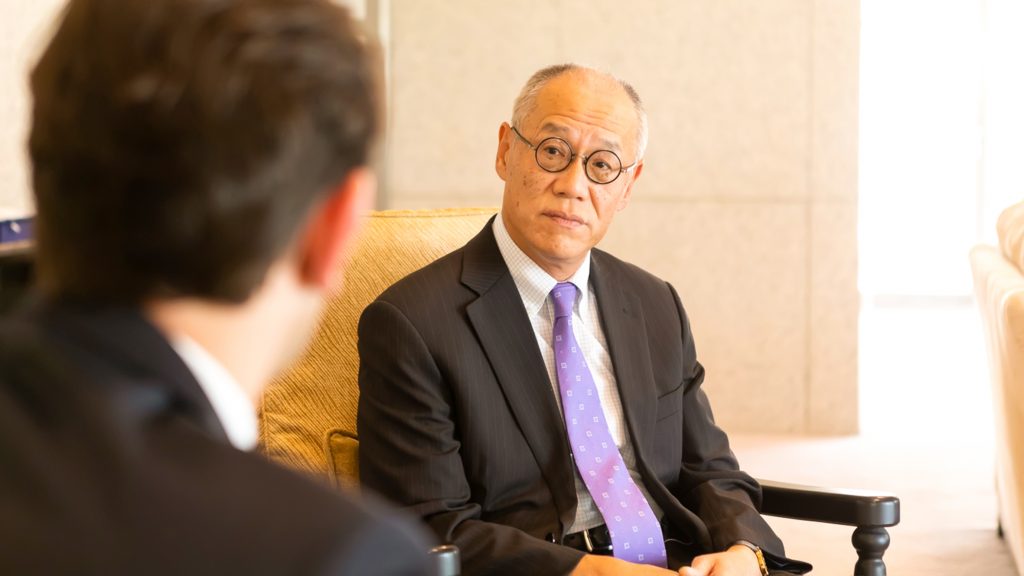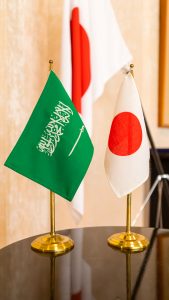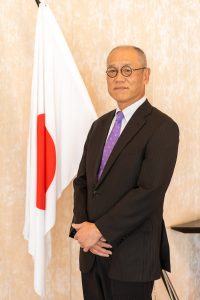
- ARAB NEWS
- 14 Jul 2025

Alexander Woodman
RIYADH: Diplomatic relations between Saudi Arabia and Japan have been built on the important values to collaborate and achieve shared visions of two countries. Since establishing the bilateral relations in 1955, the strong bond continues to grow and prosper in various areas of collaboration.
The representatives of Saudi and Japanese governments initiated such momentous initiatives as Comprehensive Partnership toward the 21st Century and Japan-Saudi Arabia Cooperation Agenda. This agreement was designed to improve such critical areas as the environment, health, science and technology, culture, sports, and human resources.
In 2001, on the occasion of Foreign Minister Yohei Kono’s visit to the Kingdom of Saudi Arabia, Kono Initiative was launched to develop dialogues with the Islamic World and engage in diverse political conversation.
Almost two decades later, the Saudi-Japanese Vision 2030 was announced, aiming to enhance the collaboration and strive for synergies between Saudi Vision 2030 and Japan’s Growth Strategy. Saudi-Japanese Vision 2030 is based on three pillars: representing the regions’ unique Diversity, Innovation, and Soft Values.
One of the most recent landmark joint projects in the Saudi-Japanese energy field became the collaboration between Saudi Aramco in partnership with Saudi Basic Industries Corporation (SABIC) and the Institute of Energy Economics Japan (IEEJ).
On September 27, 2020, the world’s first shipment of blue ammonia was dispatched from Saudi Arabia to Japan for use in a power station to produce zero-carbon power generation, paving the way for the further use of hydrogen in the energy system.
Arab News Japan met with the newly appointed Japan Ambassador to Saudi Arabia Iwai Fumio at his residency, and discussed his experience in the Middle East, as well as future goals of Japan and Saudi Arabia.
More than six decades of Saudi-Japanese cooperation has proven the true value of diplomacy and reliable partnership. How do you envision the progress of these ties for the next six decades?
During past decades, the Saudi-Japanese relations were mostly characterized in trading commodities each economy needs: particularly oil for Japan and manufactured goods for Saudi Arabia. However, with the economic and social development in the Kingdom over these years, launch of Saudi Vision 2030, the bilateral relations have also expanded significantly.
Saudi-Japan Vision 2030, which both governments launched five years ago, plays an important role in diversifying the bilateral relations. They are no longer limited to cooperation in business but also encompass political and cultural fields.
Over these five years, His Majesty King Salman visited Japan [2017], which marked the first Saudi King’s visit to Japan since 1971. In 2019, His Royal Highness Crown Prince Mohammed bin Salman participated in G20 Osaka Summit. His Royal Highness Prince Turki bin Mohammed bin Fahd attended the enthronement ceremony of new Emperor Naruhito. In January 2020, then Prime Minister Abe visited Saudi Arabia, thus establishing a fresh momentum to the developing relationship.
During my tenure as an ambassador of Japan to the Saudi Arabia, my top priority is to advance the diversification of the bilateral relations. I am confident that warm relations between Japan and Saudi Arabia will continue to develop, expanding cooperation in various fields in the coming years.

One of the central goals of Saudi Vision 2030 is economic diversification beyond relying on the oil industry. Aside from this, where do you see the Kingdom’s potential asset in the future?
Tourism is one of the promising fields in the Kingdom. When I was in Saudi Arabia ten years ago, I did not expect the development of tourism throughout the country. However, now I see a completely different picture. I recently visited Diriyah Gate a development project aimed at preserving, celebrating and transforming the iconic Saudi landmark. I have witnessed Saudi males and females proudly tell the history of the Kingdom in fluent English. In the Eastern Province, I visited Ithra, a cultural center with an incredible vision of innovation, culture and knowledge development in the Kingdom. I have also heard about the development of Al-Ula, an archaeological and historical city and the Red Sea coast project, where one can practice diving and enjoy beautiful underwater world.
Each region of the Kingdom is endowed with diverse and scenic nature, as well as historic landmarks. I am confident that tourists visiting these regions will get new experiences and impressions from Saudi Arabia, which is often referred to simply as a desert country.
Shinzo Abe, Japan’s longest-serving Prime Minister, has taken Saudi-Japanese bonds to a new level. Can you discuss Abe’s legacy that new Prime Minister Yoshihide Suga has pledged to continue, both in terms of the internal and foreign policy of Japan?
Prime Minister Abe visited 80 countries. He was the only prime minister who traveled so many countries in Japanese political history as if he had a panoramic perspective of the world map. Prime Minister Abe promoted Japan’s diplomacy to implement the policy of “Proactive Contribution to Peace” based on the principle of international cooperation. In this context, he visited many countries in the Middle East including Japan’s key partner Saudi Arabia to contribute actively to peace and stability in the region.
Free and Open Indo – Pacific (FOIP) is one of Prime Minister Abe’s signature initiatives for proactive diplomacy. It seeks to establish a rules-based international order and consolidate universal values such as free trade, freedom of navigation, and the rule of law.
In Japan, Prime Minister Abe implemented Abenomics, another signature economic policy to stimulate the domestic economy and to address the declining birthrate and aging population, which are the biggest challenges facing contemporary Japan.
This domestic and foreign policy of former Prime Minister Abe has passed on to Prime Minister Suga, who supported Prime Minister Abe as Chief Cabinet Secretary for about eight years. Prime Minister Suga participated in the G20 Riyadh Summit, reconfirming Japan’s determination for contribution to global issues.
In 2020, Saudi Aramco delivered world’s first shipment of blue ammonia to Japan. In your opinion, how can this collaboration with Japan’s Institute of Energy Economics support Japan’s zero carbon emission ambitions and transform Saudi Arabia into a global clean energy force?
In 2020, Japan launched its new goal of carbon neutrality by 2050. In addition, during Climate Summit in April 2021, Japan announced its strategy to reduce greenhouse gas emissions by 46% in 2030 compared to those in 2013. Meanwhile, Saudi Arabia commits itself to increase the proportion of natural gas and renewable energy in power generation up to 50% by 2030. Thus, the two countries are making efforts to achieve ambitious targets of international commitment in a responsible manner. I believe that the recent cooperation between Japan and Saudi Arabia in blue ammonia production is extremely important to help accomplish both of our committed goals in energy strategies by 2030.
Do you believe that this groundbreaking partnership is a step towards fulfilling the pledge of the G20 leaders made during the Osaka Summit (2019) on the energy transformation?
Yes, I believe so. Moreover, the G20 leaders’ commitments to energy transition at G20 Osaka Summit in 2019 were reaffirmed during G20 Riyadh Summit in 2020. Following the blue ammonia cooperation, it is imperative to make progress in a number of win-win projects in the private sector under the Saudi-Japan Vision 2030. Thus, both countries can become first in the world to establish a successful and commercially viable model of energy transition and to contribute to the de-carbonization of the world.
Since joining the Ministry of Foreign Affairs of Japan, you have spent many years in the Arab region. In your opinion, what makes the Arab region unique?
Arab countries are different from Japan in terms of their history, geographical location, ethnicity, and ideas on religion. The Arab population has rich cultures and resilience to overcome many difficulties. The Japanese can learn a lot from their experiences and wisdom.

Please reflect on your service and experience in Iraq from 2014 to 2018. What new did you learn about the Arab culture?
Although I had worked in Iraq under the Saddam period, I took many opportunities to revisit the question of Arab identity during my last mission there. I rediscovered that Iraq is really a cultural mosaic society composed of various religious schools and political thoughts, which I had not necessarily been able to appreciate at my first mission. Each country in the Arab world has a unique culture and sense of belonging that have been being shaped under various circumstances and histories. This characteristic stands in contrast to Japan, which I always find interesting whenever I work in the Arab world.
While in Iraq, you were honored for your knowledge and respect for Arab culture, language and tradition. How has your time in Iraq helped you to integrate into the Arab world?
During my last mission as Japanese ambassador to Iraq, I proactively interacted with the Iraqi people on Simple Notification Service (SNS) platforms, as security situations there did not permit diplomats to go out freely. This experience enabled me to polish my Arabic and deepen my understanding of Arab culture, especially Iraqi culture and tradition. Indeed, my communication over social media with the Iraqi people thankfully taught me how rich and deep Arab culture is.
Why is it important for you not only to speak the language of the country [Arabic] where you served but also to speak with the local people with their own language?
It is of great importance for any diplomat to learn a local language in a country you serve in order to understand the country. I believe speaking to the people and listening to them gives you insights into their values and lifestyles, in addition to serving for your official mission to make your country present on the grassroots level.